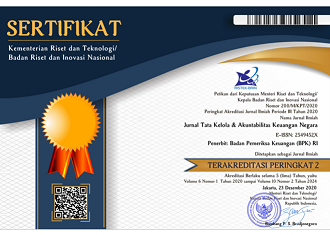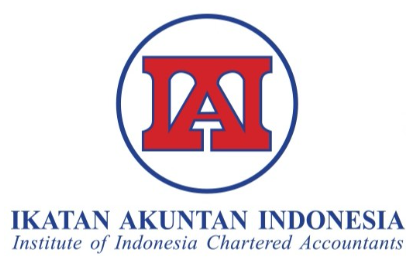Local government internal auditor stress and burnout: Supervisor support as a moderating variable
DOI:
https://doi.org/10.28986/jtaken.v9i2.1247Keywords:
stress arousal, burnout, supervisor support, internal auditor, local governmentAbstract
This study aims to empirically examine the direct relationship between stress arousal and burnout and the moderating effect of supervisor support on the relationship between the two dimensions experienced by local government internal auditors. This study uses an online survey method with a questionnaire. The sample for this study was 155 local government internal auditors from 17 City/Regency Government Inspectorate Provinces from Southern Sumatra. Based on the data analysis using SEM-PLS, the results of this study indicate that stress arousal is positively related to emotional exhaustion and depersonalization but not to reduced personal accomplishment. The results of this study also indicate that supervisor support is able to moderate the relationship between stress arousal and burnout. Supervisor support can reduce the effects of stress arousal on emotional exhaustion and depersonalization experienced by local government internal auditors and strengthen the effects of stress on personal accomplishment. Theoretically, this study supports the conservation of resources theory, which shows that supervisor support is a resource that acts as an effective coping strategy in reducing the effects of stress arousal and preventing burnout. The results also provide insights for policymakers to develop interventions for communication and monitoring based on personal conditions to improve interpersonal relations between supervisors and subordinates.
References
Alarcon, G. M. (2011). A meta-analysis of burnout with job demands, resources, and attitudes. Journal of Vocational Behavior, 79(2), 549-562. https://doi.org/10.1016/j.jvb.2011.03.007
Almer, E. D., & Kaplan, S. E. (2002). The effects of flexible work arrangements on stressors, burnout, and behavioral job outcomes in public accounting. Behavioral Research in Accounting, 14(1). https://doi.org/10.2308/bria.2002.14.1.1
Bakker, A. B., & Costa, P. L. (2014). Chronic job burnout and daily functioning: A theoretical analysis. Burnout Research, 1(3), 112-119. https://doi.org/10.1016/j.burn.2014.04.003
Blaine, B., Crocker, J., & Major, B. (1995). The unintended negative consequences of sympathy for the stigmatized. Journal of Applied Psychology, 25(10), 889-905. https://doi.org/10.1111/j.1559-1816.1995.tb02651.x
Boz, M., Martinez, I., & Munduate, L. (2009). Breaking negative consequences of relationship conflicts at work: The moderating role of work-family enrichment and supervisor support. Revista de Psicología del Trabajo y de las Organizaciones, 25(2), 113-121. https://doi.org/10.4321/s1576-59622009000200002
Brouwers, A., Evers, I. W. J. G., & Tomic, W. (2001). Self-efficacy in eliciting social support and burnout among secondary-school teachers. Journal of Applied Social Psychology, 31(7), 1474–1491. https://doi.org/10.1111/j.1559-1816.2001.tb02683.x
Charoensukmongkol, P., Moqbe, M., & Gutierrez-Wirsching, S. (2016). The role of co-worker and supervisor support on job burnout and job satisfaction. Journal of Advances in Management Research, 13(1), 4-22. https://doi.org/10.1108/JAMR-06-2014-0037
Choi, S., Cheong, K., & Feinberg, R. A. (2012). Moderating effects of supervisor support, monetary rewards, and career paths on the relationship between job burnout and turnover intentions in the context of call centers. Managing Service Quality, 22(5), 492-516. https://doi.org/10.1108/09604521211281396
Cordes, C. L., & Dougherty, T. W. (1993). A review and an integration of research on job burnout. Academy of Management Review, 18(4), 621-656. https://doi.org/10.5465/amr.1993.9402210153
Deconinck, J. B. (2010). The effect of organizational justice, perceived organizational support, and perceived supervisor support on marketing employees' level of trust. Journal of Business Research, 63(12), 1349-1355. https://doi.org/10.1016/j.jbusres.2010.01.003
Deelstra, J. T., Peeters, M. C. W., Schaufeli, W. B., Stroebe, W., Zijlstra, F. R. H., & van Doornen, L. P. (2003). Receiving instrumental support at work: when help is not welcome. Journal of Applied Psychology, 88(2), 324-331. https://doi.org/10.1037/0021-9010.88.2.324
Eisenberger, R., Huntington, R., Hutchison, S., & Sowa, D. (1986). Perceived organizational support. Journal of Applied Psychology, 71(3), 500-507. https://doi.org/10.1037/0021-9010.88.2.324
Eisenberger, R., Stinglhamber, F., Vandenberghe, C., Sucharski, I. L., & Rhoades, L. (2002). Perceived supervisor support: contributions to perceived organizational support and employee retention. Journal of Applied Psychology, 87(3), 565-573. https://doi.org/10.1037/0021-9010.87.3.565
Fogarty, T. J., & Kalbers, L. P. (2006). Internal auditor burnout: An examination of behavioral consequences. Advances in Accounting Behavioral Research, 9, 51-86. https://doi.org/10.1016/S1475-1488(06)09003-X
Fogarty, T. J., Singh, J., Rhoads, G. K., & Moore, R. K. (2000). Antecedents and consequences of burnout in accounting: Beyond the role stress model. Behavioral Research in Accounting, 12, 31-67. https://www.proquest.com/scholarly-journals/antecedents-consequences-burnout-accounting/docview/203299202/se-2
Freedy, J. R., & Hobfoll, S. E. (1994). Stress inoculation for reduction of burnout: A conservation of resources approach. Anxiety, Stress, and Coping, 6(4), 311-325. https://doi.org/10.1080/10615809408248805
Golembiewski, R. T. (1989). A note on Leiter's study: Highlighting two models of burnout. Group and Organization Studies, 14(1), 5-13. https://doi.org/10.1177/105960118901400102
Griffin, M. A., Patterson, M. G., & West, M. A. (2001). Job satisfaction and teamwork: The role of supervisor support. Journal of Organizational Behavior, 22(5), 537-550. https://doi.org/10.1002/job.101
Halbesleben, J. R. B. (2006). Sources of social support and burnout: A meta-analytic test of the conservation of resources model. Journal of Applied Psychology, 91(5), 1134-1145. https://doi.org/10.1037/0021-9010.91.5.1134
Halbesleben, J. R. B., & Buckley, M. R. (2004). Burnout in organizational life. Journal of Management, 30(6), 859-879. https://doi.org/10.1016/j.jm.2004.06.004
Halbesleben, J. R. B., Neveu, J., Paustian-Underdahl, S. C., & Westman, M. (2014). Getting to the "'COR'": Understanding the role of resources in conservation of resources theory. Journal of Management, 40(5), 1334-1364. https://doi.org/10.1177/0149206314527130
Hobfoll, S. E. (1989). Conservation of resources: A new attempt at conceptualizing stress. American Psychologist, 44(3), 513-524. https://doi.org/10.1037/0003-066X.44.3.513
Hobfoll, S. E. (2001). The influence of culture, community, and the nested self in the stress process: Advancing conservation of resources theory. Applied Psychology, 50(3), 337-421. https://doi.org/10.1111/1464-0597.00062
Hobfoll, S. E. (2010). Conservation of resources theory: Its implication for stress, health, and resilience. In S. Folkman (Ed.), The Oxford handbook of stress, health, and coping (pp. 127-147). https://doi.org/10.1093/oxfordhb/9780195375343.013.0007
Huang, H. Y., Wu, K. S., Wang, M. L., & Tang, P. S. (2015). Moderating the effect of supervisor support on work-to-family conflict and burnout relationship. Studies on Ethno-Medicine, 9(2), 263-278. https://doi.org/10.1080/09735070.2015.11905444
Janssen, P. P. M., Schaufelioe, W. B., & Houkes, I. (1999). Work-related and individual determinants of the three burnout dimensions. Work and Stress: An International Journal of Work, Health and Organisations, 13(1), 74-86. https://doi.org/10.1080/026783799296200
Kalbers, L. P., & Fogarty, T. J. (2005). Antecedents to internal auditor burnout. Journal of Managerial Issues, 17(1), 101-118. http://www.jstor.org/stable/40604477
Kalliath, P., Kalliath, T., Chan, X. W., & Chan, C. (2020). Enhancing job satisfaction through job work-family enrichment and perceived supervisor support: The case of Australian social workers. Personnel Review, 49(9), 2055-2072. https://doi.org/10.1108/PR-06-2018-0219
Kaufmann, G. M., & Beehr, T. A. (1986). Interactions between job stressors and social support: some counterintuitive results. Journal of Applied Psychology, 71(3), 522-526. https://doi.org/10.1037/0021-9010.71.3.522
Khelil, I., Akrout, O., Hussainey, K., & Noubbigh, H. (2018). Breaking the silence: An empirical analysis of the drivers of internal auditors' moral courage. International Journal of Auditing, 22(2), 268-284. https://doi.org/10.1111/ijau.12119
Kickul, T., & Posig, M. (2001). Supervisory emotional support and burnout: An explanation of reverse buffering effects. Journal of Managerial Issues, 13(3), 328-344. https://www.jstor.org/stable/40604354
Kirmeyer, S. L., & Dougherty, T. W. (1988). Workload, tension, and coping: Moderating effects of supervisor support. Personnel Psychology, 41(1), 125-139. https://doi.org/10.1111/j.1744-6570.1988.tb00635.x
Kottke, J. L., & Sharafinski, C. E. (1988). Measuring perceived supervisory and organizational support. Educational and Psychological Measurement, 48(4), 1075-1079. https://doi.org/10.1177/0013164488484024
Lepine, J. A., Podsakoff, N. P., & Lepine, M. A. (2005). A meta-analytic test of the challenge stressor-hindrance stressor framework: An explanation for inconsistent relationships among stressors and performance. Academy of Management Journal, 48(5), 764-775. https://doi.org/10.5465/amj.2005.18803921
Li, Y., Li, Y., & Castaño, G. (2019). The impact of teaching-research conflict on job burnout among university teachers: An integrated model. International Journal of Conflict Management, 31(1), 76-90. https://doi.org/10.1108/IJCMA-05-2019-0080
Liaw, Y.-J., Chi, N., & Chuang, A. (2010). Examining the mechanisms linking transformational leadership, employee customer orientation, and service performance: The mediating roles of perceived supervisor and coworker support. Journal of Business and Psychology, 25(3), 477-492. https://doi.org/10.1007/s10869-009-9145-x
Maslach, C., & Jackson, S. E. (1981). The measurement of experienced burnout. Journal of Organizational Behavior, 2(2), 99-113. https://doi.org/10.1002/job.4030020205
Mayo, M., Sanchez, J. I., Pastor, J. C., & Rodriguez, A. (2012). Supervisor and coworker support: A source congruence approach to buffering role conflict and physical stressors. The International Journal of Human Resource Management, 23(18), 3872-3889. https://doi.org/10.1080/09585192.2012.676930
Mnif, Y., & Rebai, E. (2022). Flexibility and job stress in the accounting profession. Accounting Research Journal, 35(2), 261-275. https://doi.org/10.1108/ARJ-05-2020-0097
Novriansa, A., & Riyanto, B. (2016). Role conflict and role ambiguity on local government internal auditors: the determinant and impact. Journal of Indonesian Economy and Business, 31(1), 63-82. https://doi.org/10.22146/jieb.10320
Novriansa, A., Subeki, A., & Aryanto, A. (2020). Conflict management style and role stress on government auditor: A perspective from conservation of resources theory [Paper presentation]. The 5th Sriwijaya Economics, Accounting, and Business Conference (SEABC 2019). https://doi.org/10.2991/aebmr.k.200520.053
Rahim, N. B., Osman, I., & Arumugam, P. V. (2020). Linking work-life balance and employee well-being: Do supervisor support and family support moderate the relationship? International Journal of Business and Society, 21(2), 588-606. https://doi.org/10.33736/ijbs.3273.2020
Schulz, E., Pandey, A., & Camp, R. (2018). Broken promises: Supervisory support for high-performance work practices and employee perceptions [Paper presentation]. Academy of Management Annual Meeting Proceedings 2018, Chicago. https://doi.org/10.5465/AMBPP.2018.11003abstract
Shahzad, K., Iqbal, R., Javed, B., & Hashmi, S. D. (2022). Impact of work-study conflict on workplace outcomes: Supervisor support for juggling many balls. International Journal of Conflict Management, 33(3), 475-493. https://doi.org/10.1108/IJCMA-05-2021-0069
Shanock, L. R., & Eisenberger, R. (2006). When supervisors feel supported: Relationships with subordinates' perceived supervisor support, perceived organizational support, and performance. Journal of Applied Psychology, 91(3), 689-695. https://doi.org/10.1037/0021-9010.91.3.689
Shbail, Al M., Salleh, Z., & Nor, M. N. M. (2018). Antecedents of burnout and its relationship to internal audit quality. Business and Economic Horizons, 14(4), 789-817. https://doi.org/10.22004/ag.econ.287230
Sholihin, M., & Ratmono, D. (2020). Analisis SEM-PLS dengan WarpPLS 7.0: untuk hubungan nonlinier dalam penelitian sosial dan bisnis/penulis (Edisi 2). Penerbit ANDI.
Singh, J., Goolsby, J. R., & Rhoads, G. K. (1994). Behavioral and psychological consequences of boundary spanning burnout for customer service representatives. Journal of Marketing Research, 31(4), 558-569. https://doi.org/10.1177/002224379403100409
Smith, K. J., Davy, J. A., & Everly, G. S. (2006). An assessment of the construct distinctiveness of stress arousal and burnout. Psychological Reports, 99(2), 396-406. https://doi.org/10.2466/pr0.99.2.396-406
Smith, K. J., Derrick, P. L., & Koval, M. R. (2010). Stress and its antecedents and consequences in accounting settings: An empirically derived theoretical model. Advances in Accounting Behavioral Research, 13, 113-142. https://doi.org/10.1108/S1475-1488(2010)0000013009
Smith, K. J., & Emerson, D. J. (2017). An analysis of the relation between resilience and reduced audit quality within the role stress paradigm. Advances in Accounting, 37, 1-14. https://doi.org/10.1016/j.adiac.2017.04.003
Smith, K. J., Emerson, D. J., & Everly, G. S. (2017). Stress arousal and burnout as mediators of role stress in public accounting. Advances in Accounting Behavioral Research, 20, 79-116. https://doi.org/10.1108/S1475-148820170000020004
Smith, K. J., Everly, G. S., & Haight, G. T. (2012). SAS4: Validation of a four-item measure of worry and rumination. Advances in Accounting Behavioral Research, 15, 101-131. https://doi.org/10.1108/S1475-1488(2012)0000015009
Sochos, A., Bowers, A., & Kinman, G. (2012). Work stressors, social support, and burnout in junior doctors: exploring direct and indirect pathways. Journal of Employment Counseling, 49(2), 62-73. https://doi.org/10.1002/j.2161-1920.2012.00007.x
Toolib, S. N., & Alwi, M. N. R. (2020). Job satisfaction, job demand, workaholism and supervisor support on presenteeism: A pilot study using a structural equation modeling approach. Global Business and Management Research: An International Journal, 12(4), 732-746. http://www.gbmrjournal.com/pdf/v12n4/V12N4-71.pdf
Zhang, Y., Rasheed, M. I., & Luqman, A. (2020). Work-family conflict and turnover intentions among Chinese nurses: The combined role of job and life satisfaction and perceived supervisor support. Personnel Review, 49(5), 1140-1156. https://doi.org/10.1108/PR-01-2019-0017
Downloads
Submitted
Accepted
Published
How to Cite
Issue
Section
License
Copyright (c) 2023 Jurnal Tata Kelola dan Akuntabilitas Keuangan Negara

This work is licensed under a Creative Commons Attribution-ShareAlike 4.0 International License.

Jurnal Tata Kelola dan Akuntabilitas Keuangan Negara is licensed under
a Creative Commons Attribution-ShareAlike 4.0 International License




















